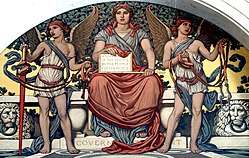Government revenue
Government revenue is money received by a government from taxes and non-tax sources to enable it to undertake government expenditures.
| Public finance |
|---|
 |
|
|
Reform |
|
Government revenue as well as government spending are components of the government budget and important tools of the government's fiscal policy.
Seignorage is one of the ways a government can increase revenue, by deflating the value of its currency in exchange for surplus revenue, by saving money this way governments can increase the price of goods too far.
Sources
Government revenue is derived from:
- Tax revenue: including taxes on the incomes and wealth accumulation of individuals and corporations and on the goods and services produced, exported and imported.
- Non-tax revenue: includes dividends from government-owned corporations, central bank revenue and capital receipts in the form of external loans and debts from international financial institutions.
gollark: ?tag lyric2
gollark: ABR is 37.0004 old.
gollark: ++list_deleted lyric
gollark: I could use ABR bans.
gollark: ++delete <@319753218592866315>
References
- Chisholm, Hugh, ed. (1911). . Encyclopædia Britannica (11th ed.). Cambridge University Press.
This article is issued from Wikipedia. The text is licensed under Creative Commons - Attribution - Sharealike. Additional terms may apply for the media files.